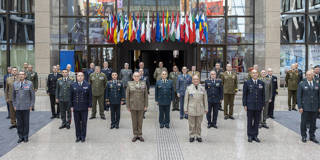Russia’s invasion of Ukraine has created a very different geopolitical context from that of 25 years ago, when the Spanish capital last hosted a NATO summit. Today, only the political will of Europeans and their leaders will be able to strengthen the continent’s security.
MADRID – At the end of June, 25 years after Madrid last hosted a NATO summit, the Spanish capital will again be the scene of a new chapter in European security. And Europe, for the most part, will have to be the protagonist. Ultimately, the Alliance’s coming gathering must help us Europeans step up and assume our responsibilities with regard to our continent’s security. That is the best and most necessary contribution that Europe can make to NATO’s future.

MADRID – At the end of June, 25 years after Madrid last hosted a NATO summit, the Spanish capital will again be the scene of a new chapter in European security. And Europe, for the most part, will have to be the protagonist. Ultimately, the Alliance’s coming gathering must help us Europeans step up and assume our responsibilities with regard to our continent’s security. That is the best and most necessary contribution that Europe can make to NATO’s future.